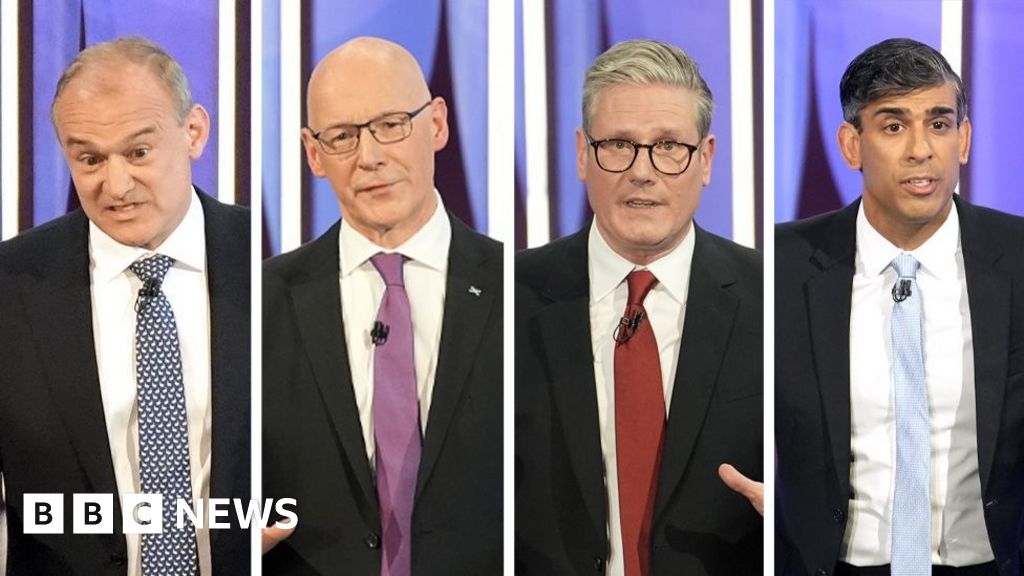World
General election 2024: Impassioned Question Time audience puts leaders on the spot

Did it change the course of the election?
For all the campaigns, that’s the question that really matters in the aftermath of the Question Time Leaders’ Special.
With the caveat that it’s often hard to tell as the embers from the event are still dying, the answer is probably not.
But there were still moments of intense political energy over the two hours, not least because of the politically engaged, forthright and often impassioned audience who gave none of the four leaders an easy time.
First up was Sir Ed Davey. For much of the campaign his eye-grabbing stunts have been taken as a successful way to grab attention for his campaign’s core messages on health and care. But within minutes they were turned against him, wielded as an accusation of un-seriousness.
Sir Ed found his footing though, with his tone appearing to disarm difficult questioners. It became clear, though, how much the compromises of the coalition still haunted the Liberal Democrats nine years after it ended. Many of the Liberal Democrats’ leading figures now came into politics after the Coalition but Sir Ed has been an MP for most of the past 27 years and was a minister throughout those five years, making that difficult territory for him. On the flipside, he’s faced those barbs plenty of times before.
John Swinney was by far the newest party leader taking part. But he is far from new to politics. Like Sir Ed he first entered the Commons in 1997 (though quickly moved north to Holyrood). Funnily enough the legal turmoil which has engulfed senior SNP figures was something of a theme.
Mr Swinney did his best not to go there, repeatedly pivoting to defend the SNP’s actions as a government. It was generally a successful tactic though it may have meant he missed an opportunity to carve out a more distinctive position to the left of the Labour Party.
And what of the two leaders, one of whom will be heading to Buckingham Palace to form a government on 5 July?
It won’t come as a surprise that they entered tonight with very different requirements and therefore very different strategies.
Sir Keir Starmer had moments of difficulty, especially over his past support for Jeremy Corbyn.
This is especially sensitive for Sir Keir not just because Mr Corbyn arouses strong feelings both among his supporters and detractors – but also because it gets to a much more fundamental question: honesty.
Notably, he said something I’ve not heard him say before – that though he never thought Mr Corbyn would win, he thinks he would have been a better prime minister than Boris Johnson.
That’s especially striking because Labour’s general election campaign is pitched particularly at voters who chose Mr Johnson over Mr Corbyn in 2019. Remember Sir Keir subsequently booted Mr Corbyn out of the Labour fold, and he is now standing against Labour as an independent.
The Labour campaign will be much happier with the moment when Sir Keir was asked a potentially awkward question about his position on transgender rights and he managed in response to hit upon some core themes of his campaign, about how he wanted to bring the country together. He won a round of applause for that.
Remember that Sir Keir’s overriding task at the moment is to not mess up, to avoid major errors. His campaign will feel that he managed to get through the session relatively unscathed.
Mr Sunak had a different mission. As things stand he is seeking a way to transform the dynamic of this election campaign. After an extremely difficult 24 hours for the Conservatives, Mr Sunak bounded on to the stage with pep in his step.
But the brutal reality of his position was exposed instantly. Good news, prime minister, you got the fastest round of applause. Bad news: it was for the member of the public demanding to know if you feel “embarrassed” to be leader of the Conservative Party.
That set a tone. So many members of the audience were visibly furious with Mr Sunak, even those who did not speak.
The prime minister did get some chances to set out his stall. When one woman told him that, for her, the election was about immigration, Mr Sunak responded that illegal immigration “undermines the sense of fairness our entire country is built on”, before touting the Rwanda plan.
It was a rare opportunity for him to deliver one of the messages which he had hoped would sit at the heart of this election campaign. Another came when he had the opportunity to talk about inflation having fallen to 2% yesterday, saying “that was something I said I’d do and I’ve done it.”
The frustration for Mr Sunak and his team will be that they have spent so long being blown off course by mishaps past and present – both last night and throughout the past four weeks.










